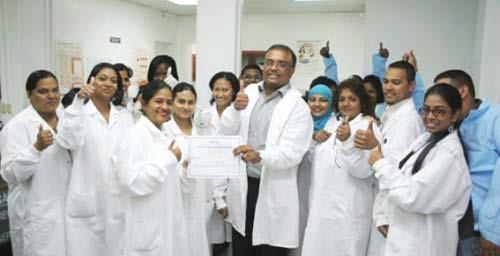Clinical laboratory organizations that seek to set themselves “apart from the herd” are seeking internally recognized quality accreditation, such as ISO 15189
Even as only a small number of clinical laboratories, in the United States have taken the steps to earn accreditation to ISO 15189 Medical Laboratories, it is a different story in other nations, particularly where no statutory requirement for medical laboratory licensure or accreditation exists.
North of the border, the Canadian Province of Ontario has based medical laboratory accreditation on ISO 15189. Over the past decade, more than 130 laboratory organizations in the province have earned accreditation to ISO 15189. Other provinces in Canada have taken steps to develop their own ISO 15189 accreditation programs.
ISO 15189 Accreditation for National Reference Laboratory
In the United Arab Emirates, a partnership involving Mubadala Development Company and Laboratory Corporation of America (NYSE: LH) operates the National Reference Laboratory. The lab facility in Dubai has both a College of American Pathologists accreditation and an ISO 15189 accreditation. Within the United States, LabCorp has a number laboratory facilities accredited to CAP 15189.
Over the past decade, European Union hospital blood banks have been required to earn ISO 15189 accreditation. France has established this requirement and thousands of medical laboratories in that country are working to earn ISO 15189 accreditation.
Even island nations in the Caribbean are moving to become accredited to ISO 15189. Earlier this year, the international journal, Lab World Magazine, featured a story about Trinidad’s St. Augustine Medical Laboratory, Ltd. (SAML) in its Volume 2, 2013 issue, according to a story published by Trinidad and Tobago’s Newsday (TT Newsday). Dr. Balmiki Ramsaran and Terrence Awai authored the story, titled “Journey of a Medical Laboratory in a Small Developing Country to achieve International Accreditation.” Ramsaran is Medical Director at SAML. Awai is a standards and quality consultant and former head of Trinidad and Tobago Bureau of Standards.

Pictured above is Dr. Balmiki Ramsaran, Medical Director of St. Augustine Medical Laboratory in Trinidad, and his staff. They are celebrating their hard-earned certificate of accreditation to the standards of ISO 15190–Medical Laboratories. The lab used Ontario, Canada’s Quality Management Program—Laboratory Services as its accrediting organization. Ramsaran pointed out that, this spring, auditors from the Canada ISO office rated the facility over 97% in conformity to standards and quality. This was as good as, or better than some of the biggest labs in Canada, Australia, South Africa, and New Zealand, according to Ramsaran.
Last year, Ramsaran received a call from Lab World’s Chief Editor, Dr. Mahesh Chander Gupta, a professor in India, according to the TT Newsday story. “He was amazed,” exclaimed Ramsaran. “He thought it was something the rest of the world should know. [H]ow a Third World country could do it and others in the First World and Second World were struggling to achieve it.”
Media in Developing Countries Focus Attention on Lab Test Quality
Media reports continue to focus attention on the efforts of medical laboratories in developing countries to bring their pathology and clinical laboratory services up to world-class quality standards. Dark Daily readers may recall our coverage last year of the efforts of ministers in African nations to address a crisis in laboratory quality in the region. (See Dark Daily, “Public Outcry over Inaccurate Medical Test Results and Misdiagnoses Spurs Government Action in Developing Countries”, November 14, 2012.) Dark Daily has also reported on increasing press coverage of the lack of reliable, accessible medical laboratory testing in India, Nepal and Sri Lanka.
Trinidad and Tobago Laboratory Achieves ISO Accreditation
St Augustine Medical Laboratory is located in St. Augustine in the Tunapuna-Piarco region of Trinidad. Its staff of 56 lab professionals conducts over 124 diagnostic tests. These cover chemistry, hematology, endocrinology, immunology, bacteriology, and parasitology. It also has “stat labs” at St. Clair’s Medical Hospital and the Brian Lara Cancer Treatment Centre in the capital city of Port of Spain.
SAML attained ISO 15189 accreditation from the Ontario Medical Laboratory Accreditation Board of Canada in 2008, the authors wrote in the Lab World story. The process was long, difficult and expensive. Earlier this year, SAML earned ISO 15189 accreditation for its two stat lab facilities, thus completing a multi-year journey.
“[It] took us the better part of seven years with lots of stops and starts,” stated Ramsaran in a story published on the American Association of Clinical Chemistry (AACC) website.
Within the United States, federal and state laws governing medical laboratory accreditation and licensure were enacted decades before most developed nations had such regulatory requirements. It is one reason why the quality of laboratory testing services in the United States has international respect.
At the same time, these federal and state laws often take decades to be updated. By contrast, the requirements and standards that make up ISO 15189 are under constant review by an international committee, and revisions to ISO 15189 have been implemented every five to seven years since the standard was first established in 2003. Thus, with the passage of years and support of more than 80 nations that currently incorporate this quality management system into their statutory medical laboratory accreditation requirements, it may be that the lab regulatory requirements in the United States will fall behind that of other developed nations.
—Pamela Scherer McLeod
Related Information:
Medical Lab achieves ISO certification
Road to ISO 15189 Accreditation for St. Augustine Medical Laboratory LTD, Trinidad
Local lab first in region for ISO status
More U.S. Medical Laboratories Ready to Step up to ISO 15189 Accreditation




I am proud to have been associated with Dr.B.Ramsaran
In the very early days of STMAL.